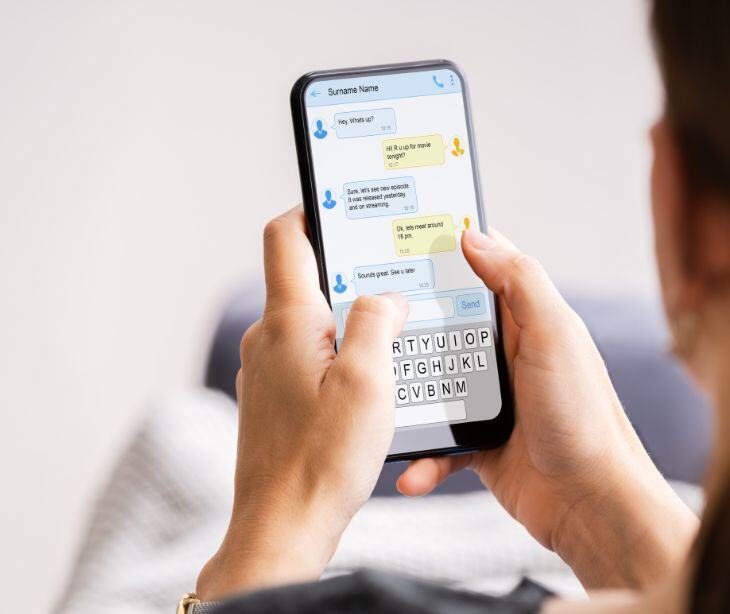2 min read
Why HIPAA compliant texting is better than traditional calls
Caitlin Anthoney June 11, 2024

HIPAA compliant texting offers a more efficient, convenient, and secure alternative to traditional phone calls. It allows providers to enhance patient engagement, improve operational efficiency, and ensure patients’ protected health information (PHI) remains protected.
What are the limitations of traditional phone calls?
Phone calls are often associated with “confidentiality concerns” and “debatable time efficiency”, explains a comparison of in-person versus telephone consultations for outpatient hospital care. More specifically, phone calls can be overheard risking disclosure of patients’ protected health information (PHI). Missed calls, voicemails, and the back-and-forth required can waste valuable time, resulting in inefficiency.
Why HIPAA compliant texting is better
Text messages are a convenient alternative to traditional phone calls. These texts can reach individuals in real-time, facilitating timely communication and support. Specifically, HIPAA compliant text messaging offers a secure and efficient way for healthcare professionals to communicate sensitive patient information while maintaining patient privacy.
A survey on replacing conventional telecommunication with HIPAA compliant texting revealed “97% of respondents reported [texting] provided at least non-inferior quality of care compared to conventional telecommunication, with a majority (75%) experiencing a relatively improved quality of care. 9% reported an unnecessary ED visit being avoided after consulting their physician through the application.”
Benefits of HIPAA compliant texting
1. Convenience: Patients can read and respond to messages at their convenience, which fits into their daily routines without having to answer calls at inconvenient times.
2. Efficiency: Texting eliminates the inefficiencies of phone tag. Simple questions and updates can be communicated quickly and directly, freeing up staff time for better patient care.
3. Improved privacy: Patients can receive sensitive information discreetly. Additionally, HIPAA compliant platforms, like Paubox, automatically encrypts messages so patients’ protected health information (PHI) remains confidential, even in busy or public environments.
4. Better engagement: Providers can send personalized reminders for appointments, medication instructions, and follow-up care which can improve patient engagement and ultimately improve patient outcomes.
5. Documented communication: HIPAA compliant text messages provide a written record of communications, which allows providers to refer to prior messages. Additionally, it helps providers keep a trail of patient interactions for auditing purposes.
How to implement HIPAA compliant text messages
1. Choose a secure platform: Providers must use a HIPAA compliant texting platform, like Paubox, which offers encryption, secure authentication, and audit controls.
2. Train staff: Provider organizations must educate their staff on HIPAA compliance and ensure they understand the types of information that can be shared and the procedures for verifying patient identities.
3. Inform patients: Providers must explain the benefits of HIPAA compliant texting to their patients and obtain their written consent before using the service.
4. Integrate with existing systems: Providers can integrate HIPAA compliant texting with their electronic health records (EHR) to streamline communication and improve efficiency in patient care.
5. Monitor and review: Text messaging must regularly be reviewed to ensure compliance and effectiveness. Additionally, providers ask patients and providers for feedback, ensuring continuous improvement.
FAQs
What is HIPAA compliant texting?
HIPAA compliant texting is a secure method of communication that meets the standards set by the Health Insurance Portability and Accountability Act (HIPAA) to protect patient information. Providers must use HIPAA compliant texting to safeguard patients’ protected health information (PHI) is protected from unauthorized access or potential breaches.
Can providers use regular text messages for PHI?
No, providers must use a HIPAA compliant platform, like Paubox, which offers security features like encryption, secure access, and audit trails to protect patient PHI.
Should patients opt-in to receive HIPAA compliant text messages?
Yes, providers must obtain explicit patient authorization before texting health information, ensuring patients have control over how their information is shared.
Subscribe to Paubox Weekly
Every Friday we'll bring you the most important news from Paubox. Our aim is to make you smarter, faster.



